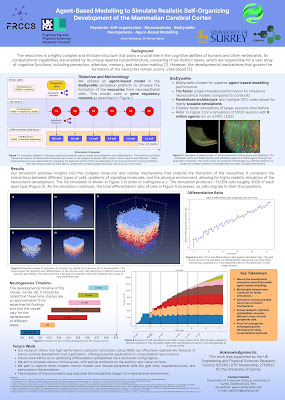BioDynaMo presented at the French Regional Conference on Complex Systems 2023 by Umar Abubacar!
Umar Abubacar, from the "COmputational Modelling of Biological sYstems and engineering” (COMBYNE) at the Department of Computer Science of the University of Surrey, presented BioDynaMo at the French Regional Conference on Complex Systems (FRCCS), and we are glad to report there has been considerable interest particularly by collaborations working on urban development, and social media dynamics.
The accepted poster showcased work supported by EPSRC DTP Studentship #2753922 (EP/R513350/1).
Umar's Doctoral project is focused on the intricate process of cortical development. Specifically, he is exploring how a layer of progenitor cells evolves into a layered cortex, by investigating the rules governing cells proliferation, differentiation, and migration. The simulation incorporates intracellular determinants and how they modify the response to external concentration gradients, echoing a biologically realistic process of human cortical development.
The target of the simulation is to mimic the developmental timeline of the mouse neocortex, whose development hinges on a carefully coordinated series of cell proliferation, maturation, and migration events, processes that work in unison to create a diverse population of neuronal and non-neuronal cell types underlying most brain and mental function as we understand them today.
The simulation presented by Umar sets a solid foundation for future research into the mechanisms responsible for shaping realistic cortical morphologies, and the generation of useful synthetic digital brains in the future. It's difficult to overstate the interest that digital recapitulations of brain development exert on researchers studying neurodevelopmental disorders where often different clinical entities share common genetic profiles suggesting that significant differences emerge from diverging trajectories of life.
The FRCCS has been a great venue for idea exchanges and discussions with experts in complex systems. BioDynaMo sparked interest for its potential in urban development and social media simulations using agent-based models. Umar's project received very positive feedback from the conference organizers, and by the public during the exchanges triggered by the presentation, corroborating the feeling that BioDynaMo is the right initiative at the right time.




Comments
Post a Comment